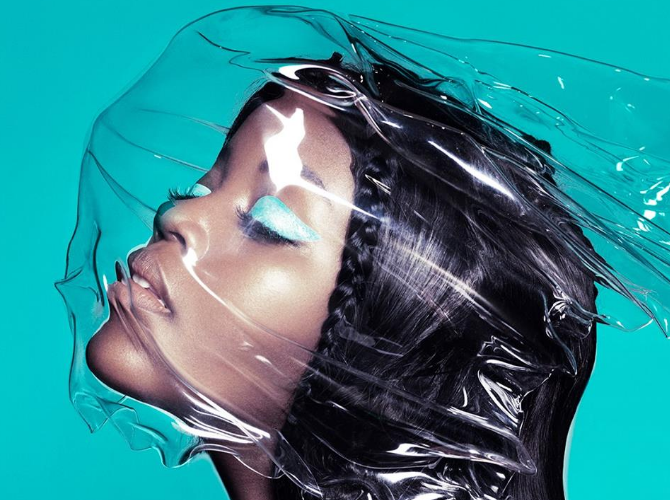
Photo: Andrew O'Toole
Scaling fluorescent sonic plains, Tkay Maidza is the fresh Zimbabwean-Australian vocal talent who bagged herself a celebrity cheerleading squad before dropping her debut LP.
Mark Ronson, Years & Years and Charli XCX are all fans and former tourmates, while her standout single Carry On features verses from Killer Mike, who can usually be found dominating stages as one half of Run The Jewels.
Maidza’s energetic debut album, ‘TKAY’, followed up her breakthrough ‘Switch Tape’ at the end of last month and further refined her sugary mix of hip hop and neon synth-pop, building on the foundations of her feature on Martin Solveig’s unforgettably infectious Do It Right.
There is a cool effortlessness that underpins Maidza’s aesthetic and her music is guaranteed to always be head-bobbingly on point. Decked out in larger than life designer creations both on and off the stage - think sequins, primary colours and blue lipstick - her creative vision lies primarily in channelling feel good vibes 24/7.
Fusing her love of rhythm, culture and decent beats, Maidza wants to inspire her audiences to escape from their struggles through her sunshine-soaked sounds.
What’s your earliest memory of experiencing music growing up?
My family has always loved music. I didn’t really learn a lot of music or study it, I was just exposed to it by being around that environment, going to concerts and my parents playing Bob Marley and Dolly Parton, Elvis Presley, Rihanna and Lauryn Hill. I started [with] covers and remixing my favourite songs when I was 15 and eventually I started writing originals because it felt more beneficial to write my own material.
Which albums had the greatest impact on ‘TKAY’?
‘Stankonia’ by Outkast, Major Lazer’s ‘Free the Universe’ and Childish Gambino’s ‘Because The Internet’.
Do you feel more closely connected with Australian or Zimbabwean culture?
Equally. I have traits from both cultures that I’m really starting to notice. I’ve lived in Australia for a long time so a lot of my habits, like the stuff I wear and the way I talk are probably really Australian but somehow I wouldn't really say I'm super connected with Australia because Australia has so many cultures and they can be super extreme depending who you are. That being said, I think I’m lucky to be from Australia because the cities are a bit slower than New York or London or L.A.. You have a lot more time to do what you want and the environment doesn’t have that feeling of struggle. So that may be why my music is happy. I try to show people a brighter side to things.
Zimbabwean culture is very rootsy. It’s about the basics. Music and dance is so important and a lot of instruments that I use in my songs are actually Zimbabwean, like the mbira. That may be why I love music so much and just living. It’s about real instruments, real people. Everything is super focused on face value like me. People also have it really tough there and always try to excel, so I think I get that hard working mentality from Zimbabwe.
If you reflect on the Sliding Doors career that could have been, how different would life look for you right now if you had become the architect you once dreamed of being?
I think it would be so different. I don’t know if I would be really happy with myself. I’m such an impulsive person, and if I don’t do something and I regret not doing it it eats at me. I have to be satisfied and I think music really completes me and challenges me in a lot of ways that I’m really grateful for.
You're becoming a real musician's musician. What makes you such an appealing talent to such established colleagues?
I have no idea. The musicians I favour and look up to mesmerise me because they are fearless. They are not afraid to be different in terms of experimenting and trying to push boundaries and send a strong message. I guess that may be what I am to other people. It’s cool, I guess, to just be noticed by great people because it means I must be doing something right.
I love Afterglow. How do you feel when reflecting upon yourself from a third person perspective and hearing that track back?
When I hear that song I’m proud that I finished it and it ended up sounding the way it did. It took a lot of re-writing but I really wanted it to be right. I think it’s an accurate representation of the experience of making the album because you have moments where people are there for you, and then you have moments where they disappear. It can make you feel really empty but sometimes it can make you feel triumphant because you survived and came out of it stronger. I wanted it to make me and others feel triumphant because no one wants to feel empty.
'TKAY' is out now on Kitsuné.
NOTE FROM THE EDITOR
We don't run any advertising! Our editorial content is solely funded by lovely people like yourself using Stereoboard's listings when buying tickets for live events. To keep supporting us, next time you're looking for concert, festival, sport or theatre tickets, please search for "Stereoboard". It costs you nothing, you may find a better price than the usual outlets, and save yourself from waiting in an endless queue on Friday mornings as we list ALL available sellers!
Let Us Know Your Thoughts
Related News |